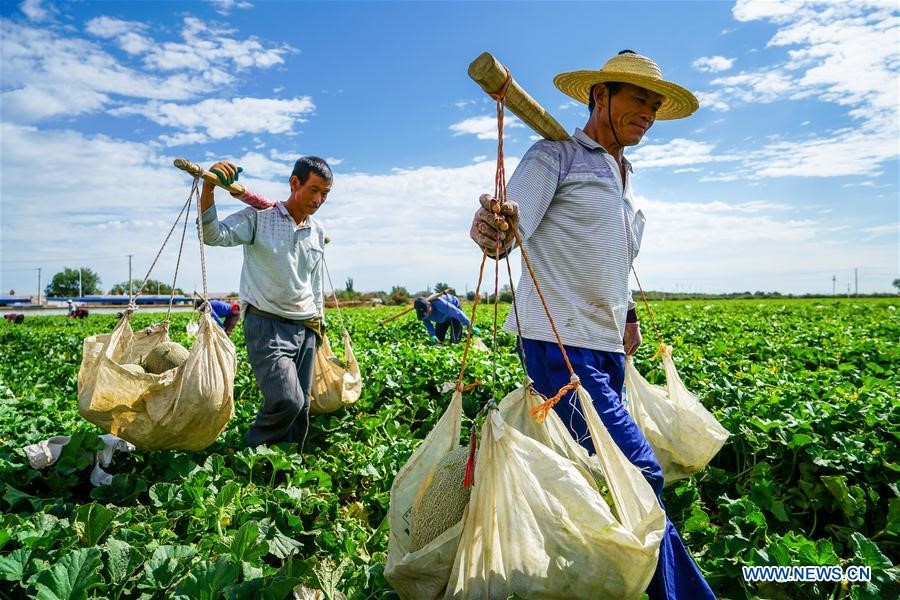With its ample golden rays of sunshine, Xinjiang has been one of the primary beneficiaries of the country’s ongoing rural e-commerce revolution. The region serves as a major agricultural production base in China and is renowned for its large cornucopia of fruits, flowers and nuts, many of which have been cultivated in the area for millennia.
Like the rest of the country, rural e-commerce has opened the door to the online marketing of a multitude of agricultural and traditional products produced in the region, including those specialty items produced in poverty-stricken areas recently connected to the world wide web with Wi-Fi and broadband access.

Farmers carry freshly harvested Hami melons in Hami City, a prefecture-level city in northwest China's Xinjiang Uygur Autonomous Region, June 27, 2018. (Xinhua/Li Hua)
Online retail sales of agricultural products in the region surged by 35.04 percent in 2020 to reach 12.1 billion yuan (1.8 billion USD), among which fresh fruits made the largest contribution at 64.45 percent, valued at 7.8 billion yuan (1.2 billion USD).
With China’s Ministry of Commerce having spearheaded programs in recent years aimed at supporting county-level cities to expand e-commerce down to the village level, Hotan City in southwestern Xinjiang managed to get its comprehensive demonstration zone for e-commerce off the ground starting in 2017 with the founding of an e-commerce park.
The municipal-level e-commerce park caters towards all seven counties in the wider region, with 118 depots spread out in villages across the prefecture, the center itself having achieved a combined 8 million yuan (1.2 million USD) in e-commerce sales in 2020, boosting the incomes of more than 1,000 households registered in the national poverty alleviation system.
According to Wang Tao, vice-director of Hotan City’s Bureau of Commerce, Industry and Information Technology, traditional producers of local agricultural products have long relied on the direct sale of their raw foodstuffs to a limited number of customers and distributors situated nearby, missing out on a wider domestic market and the more lucrative value-added functions associated with a comparatively more well-rounded value chain.
“After we introduced e-commerce, we could spur on these producers to upgrade their products, making them suitable for marketing online, in this way raising the value of the items and enhancing profitability, which likewise increases the incomes of farmers who grow the produce.”

Ershat Ibrahim introduces locally produced rose tea to prospective buyers online at a regional e-commerce center in Hotan City, Hotan Prefecture, in northwest China’s Uyghur Autonomous Region. (People's Daily Online/Kou Jie)
Ershat Ibrahim quit his job at a private company in the large industrialized metropolis of Urumqi, leaving behind the hustle and bustle of the big city to look for entrepreneurial ventures further afield in the region’s vast countryside, settling on the small county-level city of Hotan for its rich agricultural and traditional crafts industries.
“When collecting together some of the local material culture found in the countryside, I discovered many handicrafts that were being lost to time or otherwise hitherto unknown, hoping to take advantage of the business opportunities presented by these items,” he said.
Ibrahim has now been operating an e-commerce startup for the past six months together with four colleagues, making use of Douyin and other livestreaming platforms to multiply their customer base and sell local products to online shoppers from all over China. While operating a business in small rural towns and villages may present a number of challenges, the team embarked on the enterprise knowing that they could transform these challenges into their advantage with the help of the Internet and other modern technologies.
“When opening up a physical shop, the flow of customers is limited to those passing by your front door, but by setting up an online store one can achieve exponential growth in customer volumes.”
So far, rose tea and rose jam have been the best-selling items for the e-commerce vendor, with the store’s overall revenues reaching as much as 30, 000 yuan (4,640 USD) per month and with significant potential for further growth moving forward.

Online influencers Zhu Huating (left), Aliye Ablimit (right), and Muqeddes Weli (center) stand inside a vineyard while reaching out to their followers from across the country during a livestreamed broadcast promoting fresh grapes grown locally in Turpan, northwest China’s Xinjiang Uyghur Autonomous Region. (People’s Daily Online/Kou Jie)
Standing mid-day in the mid-point of a vineyard on the outskirts of the city center in Turpan, eastern Xinjiang, at temperatures rising above 40 degrees Celsius, 34-year-old Zhu Huating together with 24-year-olds Aliye Ablimit and Muqeddes Weli host a livestreamed broadcast promoting one of the locality’s hottest commodities – fresh-off-the-vine white seedless grapes. Sustained historically by an ancient underground irrigation system, the fertile oasis city of Turpan is the leading grape growing region in China and plays host to Grape Valley, a national 5A-level scenic area of lush green vineyards featuring grapes in myriad varieties.
The trio spend four hours every day on scene in the fields reaching out remotely to their followers located across the country, earning at least 9,000-10,000 yuan a month for their role as online influencers intermediating between buyers and sellers of agricultural products bought and sold in a virtual marketplace.
“E-commerce can allow people to better understand Xinjiang. Since Xinjiang is quite remote, those living in eastern China can’t fully appreciate what the region is like,” explained Zhu, who came to Turpan from Jiangsu Province three years ago. “By watching our short videos or live-streamed broadcasts, everyone is able to see Xinjiang’s cultural and specialty products for themselves.”
During the main harvesting season, in mid-July, their livestream feed can generate as many as 5,000 orders in a single day at an average of 60 yuan per transaction, with more demand for the botanical berry than can be met with the limited but bounteous local supply.
“Before when there was no e-commerce, fresh grapes could only be dried and turned into raisins since there was no way to store them, but now with platforms to sell fresh produce the grapes can be purchased directly, fetching a much higher sales price and significantly boosting the incomes of local farmers.”
Livestreamed broadcasts have emerged in a big way to become an important engine driving renewed growth in Xinjiang’s e-commerce industry. In 2020, sales on livestream e-commerce channels in Xinjiang topped 1.21 billion yuan, with well over 175 million visits from people participating in a total of 16,393 livestreamed broadcasts.
Ablimit, a Turpan native, became an online influencer after first taking part in livestreaming sessions several years ago, having now built up a fan base of 360,000 followers on her social media account. Her parents, taking up work as local grape growers, tend to more than 20 mu (1.33 hectares) of grapevines, and now solely rely on their tech-savvy daughter to market and sell their prized fruit of the vine to eager buyers far and wide.
Her colleague Weli, also born and raised locally, shares a similar experience as a livestream influencer, and relishes in the opportunity to relay stories about Turpan while sharing its best and most distinctive features to her 920,000-strong fan base online: “I’m so excited to serve as an ambassador and broadcast my hometown to our audience.” Livestreaming tripled her household’s annual income and now she is able to support her single mother who has since retired from the painstaking work of cultivating their family’s 4 mu (0.26 hectares) plot of grapevines.
When asked about her future plans, her face lit up with an expectant glance towards the distant horizon: “I hope to make more friends from all corners of the country,” she said. “I still haven’t travelled outside Xinjiang, so my biggest dream is to go out and have a look at other’s own regional specialties.”

